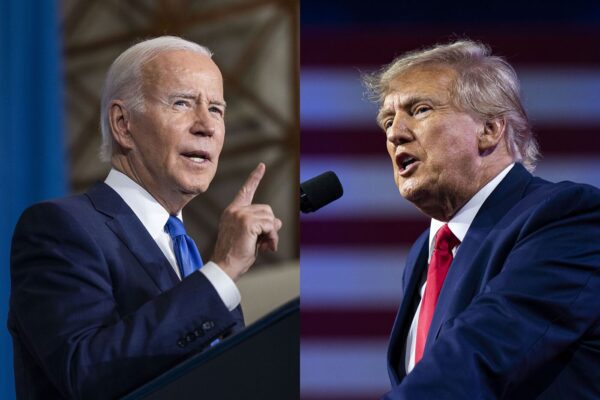When America sneezes, the world catches a cold.*
This old adage captures the level of importance of the upcoming US presidential elections and just how consequential the role of the President of one of the world’s most powerful countries is when it comes to defining the trajectory global democracy will take for years to come. The decisions made by voters this coming November will do far more than merely decide the next occupant of the White House – they will shape the global economy, influence international relations, and determine the strategic direction of US foreign policy for the foreseeable future. Be it Joe Biden, Donald Trump, or a different candidate altogether, the incoming President will be handed a country afflicted with the aftermath of the COVID-19 pandemic, economic upheavals, and a population more divided than ever before. As the rest of the world watches, will America’s choice rise to the occasion?

As of the last few months, polls suggest that the two strongest contenders for the position are incumbent President Joe Biden and former President Donald Trump, who will engage in the first presidential rematch since 1956. The advantage of both candidates having previously served as President is that their records make it possible to gauge how they might respond to critical issues such as the abortion debate, climate action, and intervention in international conflicts. Unsurprisingly, not only are Biden and Trump proponents of contrasting ideas but they also hold two inherently opposite visions for the future of the United States, which could steer America into opposite paths. Where Biden favours progressive policies, Trump tends to focus on conservative values and upkeeping the traditional American lifestyle. Where Biden typically presents himself as more empathetic and likeable, Trump is associated with harsher leadership and more polarising rhetoric. Where Biden is an avid proponent of social justice and racial equality, Trump’s focus lies in the economy. Given these differences, one might wonder what shape the resolution of today’s debates will take under the leadership of either President.
Foreign Policy Approaches and Shortcomings
Following a highly contentious first term, the Biden Administration has been criticised for its handling of international affairs: Biden’s decision to withdraw US troops from Afghanistan in 2020, which resulted in the loss of over $7 billion worth of equipment to the Taliban, tainted his credibility, and his stance on the Israel-Hamas conflict divided the American public. At the start of the Russia-Ukraine war, the disproportionality of his strong verbal condemnation of Russia versus his relatively weak actions in the region spurred further discontent. At a similar time, the approval of the controversial Willow Project was criticised for being a contradiction of his environmental commitments.
On the other hand, Donald Trump is notorious for his “America-first” approach to foreign policy in which he regularly opts to pursue nationalist, semi-isolationist objectives while relying primarily on the military as opposed to the State Department. The natural outcome of this is the neglect or even overturn of multilateral commitments, such as the withdrawal from the Trans-Pacific Partnership, United Nations Educational, Scientific and Cultural Organization (UNESCO), United Nations Human Rights Council (UNHRC), and the Paris Climate Agreement. His relatively hostile attitude to international relations and tendency to act unilaterally has resulted in a trade war with China, strained alliances with NATO members, and caused friction with allies like Canada and the European Union. Despite the virtues of isolationism in ensuring America’s security and serving as a basis for the American ‘Grand Strategy’ during the Cold War period in the 1900s, it may no longer be adequate in current affairs – other countries have opted for a more involved foreign policy strategy to cope with the demand of conflicts abroad.
Recent Controversies
On a similar note, while both Trump and Biden carry significant controversy attached to their names, Donald Trump is under particular scrutiny given recent accusations of sexual misconduct, fraud, and tax evasion. Among his most explosive legal battles concerns an alleged conspiracy to unlawfully overturn the 2020 election results by inciting violence in the Capitol and spreading misinformation. When asked if he expects political violence this November, he responded: “I do think we’re going to win. If we don’t win, you know, it depends. It always depends on the fairness of the election.” This comment is in line with Trump’s notoriety for using confrontational and aggressive language, often even with the sole intent of inciting outrage. Examples include using the popular social media platform “X” to accuse China of fabricating climate change to render US manufacturing non-competitive, claim Mexico would pay for the Trump wall, accuse Obama of wire-tapping the Trump Tower during the election, and spread multiple perverted remarks about women. Trump also faces racketeering charges upon alleged violation of Georgia’s Racketeering Influenced and Corrupt Organizations Act, for which the penalty is a maximum of 20 years, and 8 counts of conspiracy to obstruct justice by mishandling classified documents and interfering with the FBI’s effort to retrieve them, thereby violating the Espionage Act. The trial for these charges will begin in July, and could potentially lead to considerable time in prison. Though Trump could technically pardon himself if he were to win the elections, it is uncharted territory to jail a president or convict them of criminal charges.
Other personal factors such as age may be relevant to consider when it comes to assessing a candidate’s personal suitability for leadership. At the age of 81, Joe Biden is the oldest US President to ever run for reelection and, if he were to win, he would be 86 years old at the end of a second term. Trump, at 77, is not much younger. Regardless of political standing, the rational voter may wonder: will the President’s age impede decision-making? The results of a poll conducted by the New York Times show signs that this may be true. Approximately 61% of registered voters believe Joe Biden is “far too old” to be an effective president, at a far greater margin compared to Trump at 21%, despite their relatively small age difference. This surfaces the debate of whether the age of candidates should be factored more seriously into presidential outcomes, and whether a person subject to the cognitive decline that comes with advanced age is mentally fit to run a nation, especially considering the magnitude of the decisions they are responsible for. Nikki Haley, a former Republican contender and supporter of Donald Trump, has advocated for cognitive tests for presidential candidates over the age of 75.
What Now?
In the end, the race for the Presidential seat is not merely a political rivalry, but rather a battle for control over the decision-making of one of the most powerful nations on earth. Until November, American allies and citizens alike are left to question how the incoming President will respond to issues such as climate change, immigration, and international conflict, the outcomes of which may be radically different under Trump or Biden. Despite the shift away from nearly uncontested influence in recent decades, American leadership remains an undeniable force in politics, and the foreign policy of the elected President will have implications that far transcend American borders.
*This widely used saying dates back to Austrian politician Klemens von Metternich (1773 – 1859)




